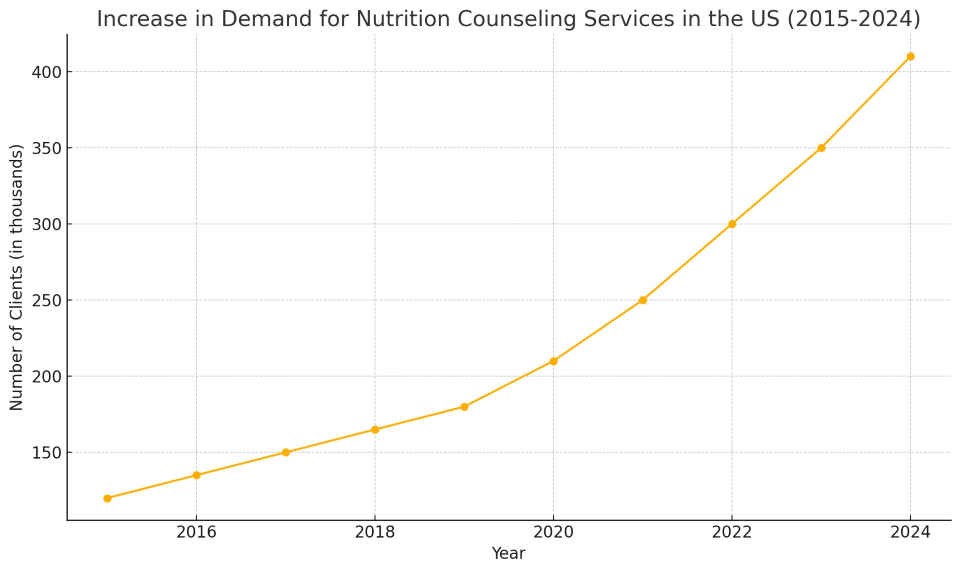In the United States, diet-related diseases like heart disease, obesity, and type 2 diabetes are driving a major chunk of healthcare costs and hospital admissions. The CDC reports that poor nutrition contributes to hundreds of thousands of deaths annually. This is where nutrition counseling becomes not just helpful—but essential.
This post explores what nutrition counseling is, why it matters, who it's for, and how it fits into the US healthcare system. If you're a patient, provider, policymaker, or just curious about your health, this breakdown will help.
What Is Nutrition Counseling?
Nutrition counseling is a personalized service provided by licensed professionals—usually registered dietitian nutritionists (RDNs)—who assess your current eating patterns, medical needs, and lifestyle and create a tailored plan to improve your health through food.
Unlike trendy diets or wellness influencers selling one-size-fits-all advice, nutrition counseling is rooted in science. It focuses on:
-
Managing or preventing disease
-
Promoting sustainable lifestyle changes
-
Considering cultural, economic, and personal preferences
Counselors work collaboratively with patients over time. The focus isn’t on restriction or perfection—it’s on realistic, evidence-based behavior change.
How the Process Works
Step 1: Initial Evaluation
The dietitian collects medical history, lab work, current eating habits, lifestyle factors, and goals. They may collaborate with physicians or specialists if needed.
Step 2: Goal Setting
The patient and counselor identify realistic, meaningful goals—like reducing sodium intake to lower blood pressure or building a consistent meal routine to manage blood sugar.
Step 3: Education and Meal Planning
You’ll learn how different foods impact your condition, energy, mood, and more. The counselor creates a personalized plan, which could include meal guides, grocery tips, or supplements.
Step 4: Ongoing Coaching
Follow-ups track progress, troubleshoot challenges, and adjust the plan. This accountability is key to long-term success.
Who Needs It?
While everyone can benefit, these groups see the most impact:
-
People with chronic diseases: Heart disease, diabetes, hypertension, and high cholesterol all respond significantly to dietary intervention.
-
People struggling with weight: Whether you're trying to lose or gain weight in a sustainable way, counseling can help.
-
Pregnant and postpartum women: A dietitian helps ensure mom and baby are getting essential nutrients.
-
Athletes: From recreational runners to professionals, sports nutrition enhances performance and recovery.
-
Seniors: Aging changes metabolism and appetite—nutrition counseling helps maintain strength and avoid malnutrition.
-
People with food allergies, intolerances, or GI issues: Dietitians guide safe, balanced eating for conditions like IBS, celiac, and lactose intolerance.
Why It Matters in the US Healthcare System
The US spends more on healthcare per person than any other country, but much of that money goes toward managing diseases that could have been prevented through better diet. Nutrition counseling offers a way to shift from reactive care to preventative care.
Key Benefits:
Nutrition Counseling Demand Is Growing
The demand for nutrition services has surged over the past decade, especially as people become more health-conscious and insurers expand wellness programs.
Here’s a graph showing the steady growth in nutrition counseling clients in the US from 2015 to 2024 (based on industry estimates):

What’s driving the growth?
-
Higher chronic disease rates
-
Increased interest in preventive care
-
More dietitian access via telehealth
-
Employer wellness incentives
-
Lifestyle diseases becoming more common, even in younger people
Challenges and Gaps
Despite clear benefits, access to nutrition counseling in the US is still limited by several structural challenges:
1. Insurance Coverage
Many private insurers now cover nutrition counseling for specific diagnoses, but coverage is inconsistent. Medicare, for example, only covers nutrition therapy for diabetes or kidney disease.
2. Provider Shortages
There’s a national shortage of registered dietitians—especially in rural areas. Telehealth is helping close the gap, but the shortage remains a hurdle.
3. Low Referral Rates
Physicians often don’t refer patients to dietitians, either due to lack of awareness or confidence that patients will follow through. Better provider education could help.
4. Equity Issues
Communities with limited access to fresh food (so-called “food deserts”) are less likely to benefit from nutrition advice unless paired with policy solutions and community support.
How to Access Nutrition Counseling
If you think nutrition counseling might benefit you (or your family), here are some steps to get started:
-
Ask Your Doctor
Many primary care physicians can refer you to a dietitian if you have a relevant medical condition.
-
Check with Your Insurance
Ask if Medical Nutrition Therapy (MNT) is covered under your plan, and under what circumstances.
-
Search Online or Use a Telehealth Platform
Sites like eatright.org allow you to find licensed RDNs by zip code or specialty.
-
Employer Wellness Benefits
Some workplaces now offer free or subsidized nutrition sessions as part of wellness perks.
-
Community Health Centers
Many nonprofit clinics offer nutrition counseling on a sliding scale or for free, especially for underserved populations.
The Future of Nutrition in Healthcare
Nutrition counseling is already playing a larger role in team-based care. In progressive clinics, dietitians work alongside physicians, mental health professionals, and pharmacists to create comprehensive care plans.
Policy changes like expanded Medicare coverage and provider training incentives could make counseling more accessible. As more people seek proactive, lifestyle-based healthcare, nutrition will likely become a standard part of the care team.
Nutrition counseling is more than a diet plan—it’s a long-term investment in your health. In a healthcare system bogged down by preventable diseases, it offers a way forward: practical, personal, and science-based support that helps people take control of their well-being.
If you’re dealing with a health issue, struggling with food choices, or just want to feel better, nutrition counseling could be your most underrated resource.